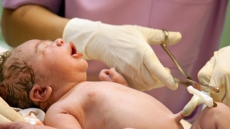Researchers are reporting another disappointment for efforts to cure infection with the AIDS virus. Six patients given blood-cell transplants similar to one that cured a man known as "the Berlin patient" have failed, and all six patients died.
So far, Timothy Ray Brown, a U.S. man treated in Germany, remains the only person thought to have been cured of infection with HIV, the virus that causes AIDS.
Brown also had leukemia, and had a bone marrow transplant in 2007 to treat the cancer from a donor with a gene mutation that confers natural resistance to HIV.
A year later, Brown's leukemia returned but his HIV did not. He had a second transplant in March 2008 from the same donor and appears to be free of both diseases since then, said the physician who treated him, Dr. Gero Huetter of the University of Berlin.
In a research letter in Thursday's New England Journal of Medicine, Huetter tells of six other patients with HIV and various blood cancers who received similar transplants. He advised on some of the cases but did not perform the transplants.
One of the six patients was from Minneapolis. Two were from Germany and the others were from the Netherlands, Chile and Spain.
"They all died within a couple months of the transplant," likely from their underlying disease or the risky and grueling transplant itself, Huetter said.
In some, there were signs that HIV had found another way into cells to overcome the natural resistance the donors had.
"That is disappointing ... we always knew that was a risk," but it should not doom efforts to cure HIV infection through other means, said Dr. Steven Deeks, an AIDS specialist at the University of California, San Francisco.
He is working on other strategies to modify patients' own cells to try to defeat HIV, something less risky than the transplants attempted in these cancer patients.
Earlier this year, doctors reported another setback to hopes for a cure. A Mississippi baby who doctors hoped had been cured by very aggressive, early treatment showed new signs of the disease.





